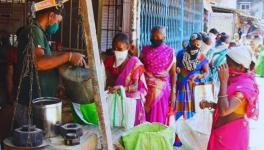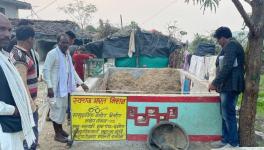COVID-19 in Rural India-XI: Landless and Manual Labourers hit the Most in Irengband
Image use for Representational only. image Courtesy: Reuters
This is the 11th report in a series that provides glimpses into the impact of COVID-19-related policies on life in rural India. The series, commissioned by the Society for Social and Economic Research, comprises reports by various scholars who have been conducting village studies in different parts of India. The reports have been prepared on the basis of telephonic interviews with key informants in their study villages. This report describes the impact of the COVID-19 pandemic and the nationwide lockdown onthe lives and livelihoods of the inhabitants, mainly from the Meitei community, of Irengband, who are facing loss of work amid steep rise in prices of essentials.
Irengband village is located in Kakching district in the North eastern state of Manipur. It is a relatively large village with about 2,215 households and a population of about 11,664 according to the Socio-Economic and Caste Census 2011 (SECC 2011).
As in other parts of Manipur, Irengband has afavourable sex ratio of 1,007 (SECC 2011). All the households in the village belong to the Meitei community, which falls in the Other Backward Class (OBC) category.
Although a large number of households are engaged in agriculture, only a small portion of them derive the major part of their income from it (9.5%). Estimates from a recent survey in the village show that about 50% of households had entered into leases for small plots of agricultural land. However, given the small size of operational land holdings, most households are also engaged in manual labour.
According to the same survey, about 10% of households have no land and depend only on casual manual labour, both agricultural and non-agricultural, to ustain themselves. The non-agricultural occupations these workers engage in are stone crushing, construction and brick kilns.
In Irengband, a large expanse of agricultural land is left fallow during the rabi season; thus many peasants also work as casual manual labourers during this season.
Paddy is the main crop grown in the kharif season. Only a few farmers grow mustard and potato in the rabi season; the outbreak of COVID-19 coincided with the harvest season for these two rabi crops.
As larger gatherings are restricted during the lockdown period, two respondents reported having to manage the harvesting with the use of family labour, and working only early in the mornings. Another farmer said he had managed to hire 92 workers for the harvesting of a little over three acres of mustard during the lockdown period.
The shortage of agricultural inputs is not a major concern at the moment as most land was allowed to remain fallow during the rabi season. There is a worry, however, that timely inputs will not be available for the next kharif season.
Workers from the village also migrate out in search of work, mostly to other towns and to the state capital, Imphal.
Due to the lockdown, migrant workers have returned from their workplaces and are now left with no work. A migrant worker, who is illiterate and used to work as a construction labourer at a site in Mayang Langjing in West Imphal (about 55 kilometres away from Irengband), had to leave his workplace without the wages due to him on March 22, when the Janata Curfew was imposed. He reached the village at midnight after having walked for about 45 km, as there was no other mode of transport.
Another migrant worker from a poor household had been on the verge of travelling to his work place when the lockdown was announced. He has now lost the opportunity to work and earn an income.
There is no bank or ATM in the village and the closest banking facility, including access to an ATM, is in Kakching town, which is about three km away. All the respondents said that since they have been instructed to stay home during the lockdown period, and there are frequent police patrols to monitor this, none of them has risked leaving the village. One respondent reported having received her share from a chit fund in which she had invested money a few days before the lockdown was imposed. This has enabled her to meet household expenses and allowed her to avoid stepping out to withdraw cash.
Others mentioned that the lack of connectivity with banking and financial institutions has impacted them: two respondents have received Rs 500 each in their Jan Dhan accounts on April 5, 2020 but they have not been able to withdraw this cash yet.
There has been a surge in the prices of essential food commodities in the village. The price of chana dal has doubled to Rs 80 per kg since the lockdown began; potato prices have increased from Rs24 per kg pre-lockdown to Rs 60 per kg; the price of mustard oil has risen from Rs 100 per litre before the lockdown to Rs 130 per litre.
A supply crunch and steep rise in prices of essentials have hit the villagers hard. The market within the village has only a few retail shops, and people supplemented what they could get here with supplies from Kakching town even in normal times,but this isn’t possible at the moment.
In order to address the situation, some individuals from the village have come forward to make arrangements for the distribution of certain essential commodities (other than rice) at considerably lower prices. Under this private initiative, potatoes are sold at Rs 30 per kg,onions at Rs 45 per kg, dry peas at Rs 60 per kg and lentils at Rs 65 per kg.
A second initiative by a local club has identified about 100 vulnerable households in the village and mobilised material support for them. An elected ward member has also identified about 30 widow households and distributed 5 kg of rice, one kg of potatoes and half a litreof edible oil to each of them. One of the respondents from a landowning household said her family also distributed 4 kg of self-produced rice, half a kilogram of lentils and 250 ml of mustard oil to 30 vulnerable families identified by the ward member. According to her,the limited supply of essential food items in the village is the main challenge to the community and to individual efforts to extend non-financial support.
All the respondents mentioned the importance of home-grown vegetables and tubers. Households that had procured essential supplies earlier and who have home grown-vegetables share them with their neighbours. There is also an active effort to collectively identify vulnerable households in the locality and extend support to them.
Irengband village has a significant number of small-scale milk producers who are now finding it difficult to access markets to sell their milk. Usually, milk was collected from the village by wholesalers, who then sold it in Kakching. A livestock keeper said he used to sell two-and-a-half to three litres of milk per day at the price of Rs 30 per litre to wholesale buyers.
Now the sale of milk to wholesalers has completely stopped and milk is being shared with relatives and neighbours. The small yet regular income from the sale of milk that milk-producing households used to get has now stopped.
Weaving is an important occupation undertaken by women in the village. There are two types of weavers in the village. The first kind receive raw material from contractors who then collect the woven cloth and pay wages for the work done. These weavers are continuing their work during the lockdown, albeit at a slower pace. The second kind are small, independent weavers who procure their own raw material and sell their products themselves. These independent weavers are now facing difficulties in the procurement of raw materials as well as in the selling of their products.
A weaver reported that she has six finished items worth Rs 1,000 each but cannot sell them due to the lockdown. Similarly, a carpenter who runs a furniture shop from his home said he was unable to fulfil work orders taken in advance due to the shortage of raw materials.
The current crisis has also severely affected petty businesses in the village.The chief minister of Manipur announced that 5 kg of rice would be distributed to each individual in all households in the state for free in April 2020. However, according to our respondents, the distribution of 5 kg of rice is only limited only to those on the voters’list. Also, anyone under 18 years of age was excluded from receiving this benefit.
A respondent from a household with 15 members said they had received only 40 kg of rice as part of this initiative, which is far less than what they require. Restricting distribution of rice only to those in the voters’ list also automatically excludes migrant workers and their families from receiving this benefit.
The impact of the restrictions imposed due to the COVID-19 pandemic is likely to put severe stress on those engaged in agriculture. The preparation of land for paddy cultivation is due to start in May and there is fear among cultivators that there will be a delay in kharif cropoperations. The most vulnerable are landless and manual labour-dependent households who have no other source of income. These households require special attention and immediate intervention during these extraordinary times.
[Telephonic interviews with members of 10 households were conducted between March 30 and April 9, 2020 in order to gather information on the current circumstances of the village. Among the 10 households contacted,four households own agricultural land, while five households practise agriculture on leased landand the remaining household is completely dependent on casual manual labour. The key respondents included farmers, migrant workers, weavers, a carpenter, a livestock keeper, home-makers and a pensioner.]
The writer is a Research Scholar,Centre for Economic Studies and Planning,Jawaharlal Nehru University, Delhi.
Get the latest reports & analysis with people's perspective on Protests, movements & deep analytical videos, discussions of the current affairs in your Telegram app. Subscribe to NewsClick's Telegram channel & get Real-Time updates on stories, as they get published on our website.
























